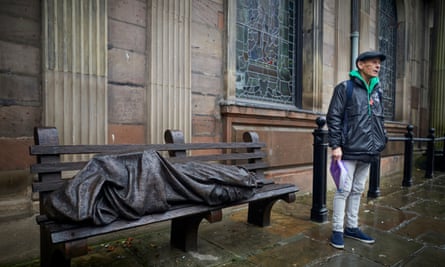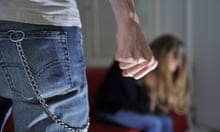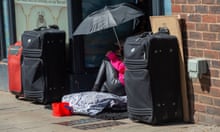“There’s no lights in this one, so be very, very careful,” warned the tour guide, Danny Collins, as he led the way through a dark and dingy underpass in Manchester city centre. Even in daylight, it is not the place to stop and take a picture. “Imagine having to sleep there every night,” Collins said.
This is not your usual selfie-friendly tour of a city’s highlights. Collins, a former soldier who spent four years living on the streets, is leading an alternative guide to Manchester focusing on its homelessness problem.
Taking visitors to the street corners where he slept rough and spent most of his time, the 62-year-old said he wanted homeless people to show “their Manchester” as a way to get off the streets.
His first tour took place against a gloomy backdrop on Sunday. The bodies of two men, both believed to be rough sleepers, were found in Manchester city centre at the weekend.
Street cleaners found one man unresponsive in a doorway at 9am on Saturday; less than 24 hours later, a 60-year-old man was found a short walk away. Homeless charities are believed to be aware of both deaths, which were quickly declared non-suspicious by police.
Collins, who said he had lost two of his friends on the streets, said he had seen first-hand the homelessness crisis grow over the past two years. “The amount of rough sleepers I see has doubled but what we’re also seeing now is a lot of younger people on the street,” he said as he guided a small group of tourists around St Ann’s square, where a sculpture of Jesus Christ as a homeless man on a park bench was unveiled in April.

“At one stage, the older rough sleepers and transits used to look after each other. Now they’re fighting each other. There are gang wars going on between homeless people. It’s a big problem at the moment.”
Those tackling Greater Manchester’s homelessness problem believe there are more than 500 long-term rough sleepers in the region, almost twice as many as an official count had suggested.
Yet those figures account only for those sleeping on the streets, Collins said. More than 3,000 people in Greater Manchester are homeless when taking into account those in temporary accommodation, couch-surfing, or in bed and breakfasts, he added.
Andy Burnham, the Greater Manchester mayor, pledged in his manifesto to eradicate rough sleeping in the region by 2020. Out of the 500 homeless people, more than 100 have moved in to homes offered up by housing associations and private landlords under a three year project that started in December.
At least 440 rough sleepers died on Britain’s streets or in temporary accommodation in the past year, an investigation revealed earlier this month. The figures, compiled by the Bureau of Investigative Journalism (BIJ), are likely to be a substantial underestimate as no official organisation counts homeless deaths in Britain. Data shows there were at least 449 deaths in a year – more than one per day.
Collins, originally from Liverpool, spent four and a half years living on the streets before finding help from homeless charity the Booth Centre. He spent his first night in his new home on Christmas Eve 2016.

The tattooed army veteran, who suffers from post-traumatic stress disorder, said his life had been turned around with the support of volunteers at the Booth centre and now he wanted to do the same for others: “Two years ago you couldn’t get two words out of me. Now you can’t shut me up.”
Asked whether enough was being done to combat the problem, Collins said he didn’t want to comment on politicians but added: “There is change and people are listening, but – no, there’s not enough being done.”
The tour is run by the social enterprise Invisible Cities and is the brainchild of 20-year-old Alice Sparks, who said she was struck by Manchester’s homelessness issue when she moved to the city two years ago to study.
There are plans for similar tours run by homeless people in Liverpool, Bristol, York and Birmingham. More than 100 people have already booked on to the two-hour Manchester tour for the next few weeks, according to the organisers. Any profit from the tickets, which cost £10 each, will go towards publishing a book of poetry written by Collins.









